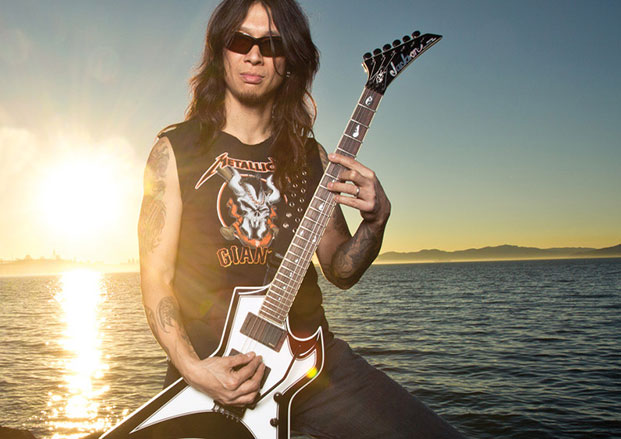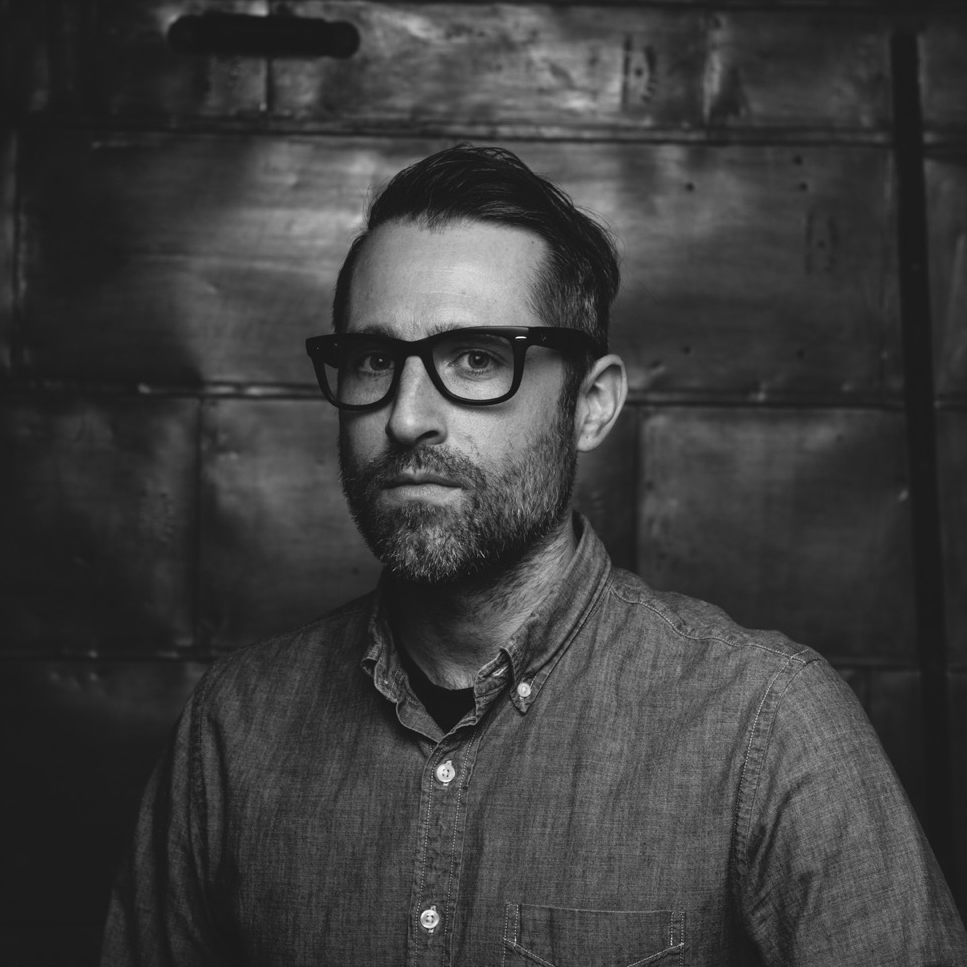Death Angel's Rob Cavestany Talks 'The Evil Divide,' Influences and Signature Jackson Guitar

He’s been a key fixture on the Bay Area thrash metal scene for more than 30 years and still has one of the most devastating riff-hands in the business, but what Guitar World readers really want to know is…
Who was the last guitarist you heard that made you shake your head and go, holy f*ck! —Kevin Joel Koski
There are some players, but they’re not very new…I’m just new to catching the wave. [laughs] I’m a little late to the party, but I’m glad I finally got there! I was searching around on YouTube looking for some inspiration and I came across an old-school player that I never delved into: Paul Gilbert. He’s amazing! I’ve been checking out some tips from his videos lately. Another one is my producer Jason Suecof. I’ve sat there for three albums with him producing, mentoring and pushing the living shit of my playing like nobody’s ever done. He’s an amazing player.
Also, Jason made me really listen to Marty Friedman’s playing on Megadeth’s Rust in Peace. I always knew Marty’s playing was insane, but back in the day there was a bit of a rivalry where you were either following Metallica or Megadeth. I was following Metallica. They were Bay Area dudes and I was so down with them that it made me not want to hear Megadeth. But lately I’ve discovered the magic that is Marty Friedman. One other player we’ve played shows with that I was very impressed by is the dude from Carcass, Bill Steer. With his bellbottoms, long hair and Les Paul, his look reminds me of Randy Rhoads. I dig his style, and his playing and feel for that kind of music is really great.
I’m really digging The Evil Divide. It’s seriously crushing, and the guitar tone is really angry. What was the recording chain? —František Žárovský
We used a few different amps and guitars, but the main tone on this album is from my custom signature series Jacksons. On this album we have two different tunings going on. I did all the drop-C# stuff with my blue one and the Eb stuff with my white one. Those are going straight into my old 1970 Marshall Super Lead, which I’ve had since 1988 when I first used it on our Frolic Through the Park album. It was hot-rodded by a guy called Dave Ray out of San Rafael, and has a nice raw tone. That’s pretty much it, besides an original [Ibanez] Tube Screamer for some enhancements of distortion and gain.
Besides thrash metal what kind of music or guitarists do you love listening to? —Jonathan G. Miranda
Get The Pick Newsletter
All the latest guitar news, interviews, lessons, reviews, deals and more, direct to your inbox!
This is great because I often do not listen to thrash metal. The guitarists I was originally inspired by were not playing thrash metal. The first guy that turned me on to playing guitar was Jimmy Page. Led Zeppelin was the first rock band I idolized. Right beside him is Tony Iommi, because I listened to a lot of Sabbath. I know these dudes aren’t recognized for their precise shredding abilities, but that’s probably what I loved about them. They have a certain emotional expression in their playing that makes it very unique and hard to copy. It just moves me when they play.
When it comes to lead guitar playing and composition my true guitar hero is Randy Rhoads. Not only for his playing, but his style, look and his Jackson guitars. Then I have to give a nod to Uli Roth and Stevie Ray Vaughan. I hope I don’t get persecuted for this: I absolutely respect and love Jimi Hendrix for the innovator he was and for his style, but I grew up on Uli Roth and Stevie Ray Vaughan’s version of Jimi Hendrix. So for me, they’re like Jimi Hendrix but turbo charged and a bit cleaner and more defined.
What was the first record or cassette that you can remember buying with your own money? —Chris Floudiotis
I have a clear vision of buying Let There Be Rock by AC/DC. I remember looking at all the album covers in the bin. You’re not supposed to judge a book—or record—by its cover, but as a kid I saw the green people in the audience and Angus [Young], and I was like, Dude this must be sick! And yes, that album delivered when I put it on my record player. That raw guitar tone was insane. One of the first cassettes I ever bought was Heaven and Hell by Black Sabbath [featuring vocalist Ronnie James Dio]. I played the shit out of that, and that’s what I thought Black Sabbath sounded like. So when I bought my second Sabbath cassette, We Sold Our Souls for Rock ‘N’ Roll—which opens with [Ozzy Osbourne singing] “Black Sabbath”—I sat there thinking, What the hell is wrong with this guy’s voice! I thought my cassette was warped. [laughs] Soon thereafter I realized there were different singers and fell in love with both versions of Sabbath.
Very shortly thereafter I got Led Zeppelin’s In Through the Out Door, and fell in love with that album, too. I can never forget that cassette because that was the era of time when I bought my first joint. I was so nervous about trying weed and my parents finding it that I just kept that joint inside that In Through the Out Door cassette case for weeks and weeks before I got the guts to try it out! [laughs] I’d be sitting in my room thinking that my parents were going to smell my cassette. [laughs] But I couldn’t get rid of it because it was one of my favorites! But they never did and I eventually smoked it. And it was so dry! [laughs]
How do you maintain the lifestyle you live and pay the bills when you don’t have the level of success a band like Metallica has? —Jason Lagud
I love this question. It dispels the mythological picture that people have of us. Without playing the little fiddle and crying your brains out for poor Rob and his band…it is extremely difficult. It’s the challenge of my life. There’s been multiple times when it’s been so tough on a survival level that you’re really searching yourself wondering if you’re doing the right thing, or if you’re selfishly chasing your obsession and dream and hurting everybody else. There was a point when we did Relentless Retribution where it got really dark. We had lineup changes and it was a crossroads. Our original bass player and drummer [Dennis Pepa and Andy Galeon, respectively] left the band because they each had their second kid and it was brutal and unrealistic for them to go roaming the world when they had mouths to feed and nothing to show for it when they came home except talking about all these great shows you played and all the free beer you had on tour.
I had to surrender myself to music and realize I had been doing it since I was a little kid and I’ve got my whole life invested in it. It’s what I was put on this earth to do. It’s the thing I can do best over anything else and I have to make it work. So I do everything I can to make it work. Which means I barely rest or sleep, and I work when we’re not on tour. Everyone in our band has full-time day jobs when we’re not touring. For me I luckily kept it in the music world, and I’m a guitar teacher to a great bunch of students. When I’m at home I’m a hermit, I just want to spend time with my loved ones that I miss so dearly being gone half my life. It’s painful, but at the same time you experience these incredible highs. It’s all part of it. Our music is so emotional and intense because I put all that into it. It’s a curse and a blessing and the destiny that’s been laid out in front of me.
I really enjoyed your solo acoustic album Lines On the Road. Do you have any additional solo material you are considering releasing? —Doug Gross
Wow, thanks for bringing that up, Doug. I do have tons of songs and parts of songs and instrumentals recorded. Believe or not I don’t only play thrash. [laughs] I gotta get these ideas and emotions out because if I don’t they’ll make their way into Death Angel, and bum out a lot of people! I hope one day to record that stuff better and release it. But Death Angel is my main thing. It’s the mothership, and it needs all my attention. I’m not gonna put my guys on hold to pursue a side project. My own thing has to wait until some unforeseen downtime happens or I just finally get too old for thrash! [laughs]
When is your signature Jackson going into production for the masses? We need it, man! —Jonathan Drumeller
When Jackson wakes up! [laughs] No, I’m kidding. But I love this question going in public because it’s something I’ve dreamt of ever since Grover Jackson built the guitar for me back in 1989. I’ve been asked this question for decades now, and I guess it’s just up to Jackson. So one can only hope and dream!
Brad is a Brooklyn-based writer, editor and video producer. He is the former content director of Revolver magazine and executive editor of Guitar World. His work has appeared in Vice, Guitar Aficionado, Inked and more. He’s also a die-hard Les Paul player who wishes he never sold his 1987 Marshall Silver Jubilee half stack.
“I heard the Money solo and thought, ‘This is amazing!’ So I sent David a telegram saying, ‘Remember me? I'm in a band now called Roxy Music’”: Phil Manzanera on his friendship with David Gilmour, and the key to the Pink Floyd man's unmistakable tone
“It’s really quite genius, but also hard to learn – it sounds insane, but sometimes the easiest songs still get me nervous”: Kiki Wong reveals the Smashing Pumpkins song she had the most trouble with











